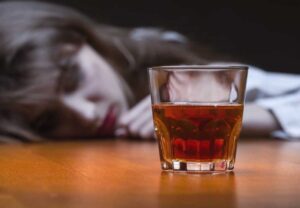7 Warning Signs of Alcoholism

Alcoholism, or alcohol use disorder, affects 6.2% of the U.S. adult population, or approximately some 15.1 million people over the age of 18. Alcohol is the most commonly accepted intoxicating substance in the world, despite being one of the most common causes of preventable death. Alcohol use disorder is characterized by an inability to quit or control alcohol consumption, despite deleterious effects on personal and social life. And, for the millions of people who struggle with it, it’s life changing and damaging to health, mental health, and the ability to have a life.
If you or a loved one is struggling with alcohol, drinking too much, or beginning to show warning signs of alcoholism, it’s important to pay attention. Acting quickly and getting help can save someone years of pain and grief, can reduce the negative effects of long-term binge drinking, and will help someone get their life back on track.
You’re Drinking More for the Same Effects or Any Effect
Alcohol tolerance is one of the first warning signs of alcoholism, although it doesn’t necessarily mean you have a problem on its own. Tolerance happens when your body adjusts to the level of intoxicant in your system and begins to compensate for it. At this point, you can drink considerably more than you used to without becoming intoxicated. To an extent, this process will happen to anyone who drinks more than a few times a month. The first time you drink, a single beer will likely get you tipsy. Over time most people can have many more over the course of an evening before. However, it becomes problematic when you drink to get drunk and consistently consume more and more alcohol over time to maintain being able to get drunk.
Higher regular alcohol consumption greatly increases your risk of substance use disorder, because exposure is the greatest common cause of addiction. High tolerance is a symptom of drinking large quantities of alcohol on a normal basis, meaning you’re likely drinking enough for it to be problematic.
You’re Hiding How Much You Drink from Friends and Family
Alcohol is one of the most accepted substances in the world. Today, some 80% of adults in the United States drink at least occasionally. It’s stranger to find events without alcohol than to find events with people drinking heavily. So, if you’re drinking to the point where you think you have to hide it, you likely have a problem.
Hiding drinks usually occurs in situations where:
- You’re drinking outside of social events where alcohol use is accepted
- You’re drinking during the day or in situations where you shouldn’t
- You’re drinking more than you should
- Your friends and family have expressed concern over how much you drink
- You feel that your drinking is problematic and don’t want others to realize it
Any of these reasons is a good sign that something is wrong and you should cut back or quit altogether.
You Think You Should Quit or Tried to Quit and Can’t
If you realize you have a drinking problem to the point where you think you should quit or even have tried, but can’t manage, you have a problem. Compulsive drinking, where you cannot stop yourself from drinking or compulsively accept it when offered and experience cravings when you don’t have it is one of the DSM 5 factors for substance use disorder.
Most people avoid ever getting to this point by telling themselves they have reasons to drink today, next week, the day after. The issue is that if you think you should cut back or quit but keep finding reasons not to (like a party coming up, a big celebration, or something stressful at work), you’re probably falling into the category of “you can’t”.
You Can’t Control How Much You Drink
If you frequently start out the evening thinking you’ll have a few drinks and end up out of control, don’t know how to control how much you drink, experience blackouts, or don’t remember what happens when you drink, you’re probably experiencing problematic drinking. Alcohol binging is not a healthy symptom even in individuals who never drink, but on a regular basis, it’s a strong symptom of alcohol dependence and addiction.
This is especially true if you actively want to drink less but still binge every time you’re around alcohol.
You Think About Drinking All the Time

If you wake up and look forward to the evening when you can drink, look forward to weekends when you can drink, or otherwise spend a significant amount of time thinking about, planning, and looking forward to simply consuming alcohol, you probably have a problematic relationship with alcohol. This also applies if you spend a significant amount of time or energy acquiring alcohol, getting to places where you can drink it, or a significant portion of your income on it.
What does that look like in some social situations?
- You skip meals so you can have alcohol without impacting your diet or weight
- You have a set budget for a party but after running out of alcohol, go spend a significant amount over budget
- You frequently drive to a liquor store to purchase alcohol on your way home
- You think about how and when you will drink throughout the day
- You think about drinking alcohol when stressful events occur or go to purchase alcohol after stressful events (such as a traffic jam, a negative talk with your boss, or a stressful social interaction)
Alcohol should not be a major part of your life. If it is, you should examine why, how much you’re consuming, and why.
You Drink in Situations Where it Could Have Negative Consequences
Most people drink to feel better, to have fun, to relax, or to fit in. But, if you find yourself drinking for any reason in situations that don’t call for it, you might be developing a problem. Healthy individuals don’t normally drink at work, while taking care of their children, before operating vehicles, before taking tests or exams, or in response to stress.
Drinking in situations where alcohol could reduce your performance, cause you to be a danger to yourself or others, or impact your ability to engage with the situation as you might want is a sign of alcoholism. This is more true if you are aware that drinking in these situations is negative (most of us are), but convince yourself that you can manage anyway, that you need it, or that you won’t’ actually get drunk enough for it to matter anyway. Over time this will escalate to arrests for driving under the influence, car accidents, work accidents or decreases in work performance, and otherwise negative effects to your career, personal life, and health.
You Feel Hungover or Sick When You Don’t Drink

Physical dependence happens when the body, but especially the central nervous system, adapt to changes in chemicals in the brain. When you drink alcohol, the brain changes GABA production and absorption, which impacts the central nervous system. When you develop tolerance, the body adjusts its normal production to attempt to return that production to normal. So, when you stop drinking, you experience side effects, typically starting with hangover like effects including headache and maybe a runny nose. Over time, these symptoms get worse until you will feel like you have a very bad cold or flu, with pain, hot and cold flashes, nausea and stomach upset, and strong cravings. This is alcohol withdrawal, and it will get worse. If you’re experiencing withdrawal when you don’t drink for more than a day or two, you are chemically dependent and you do need help.
Alcoholism is a serious disorder and one that will have major physical and mental health ramifications. Persons with alcohol use disorder struggle to pursue goals, maintain relationships, maintain physical health, and interact with people or jobs in ways that create fulfilment, life satisfaction, or happiness. It’s important to seek out rehabilitation and therapy to help you through physical detox before you move into therapy and behavioral therapy. Rehab is about learning to get your life back, learning to manage stress and events without alcohol, and learning how to be you again. If you or a loved one is struggling, getting help now will change your life.


